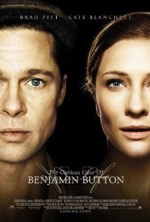The Curious Case of Benjamin Button (PG-13)

Starring: Brad Pitt
December 2008
“Masterly Telling of Fitzgerald’s Timeless Tale”
Originally, I had considered writing this review backwards, in keeping with the movie’s reverse polarity plot, but decided it would require too much effort to write and would be too demanding on the reader. So then, this linear review of director David Fincher’s The Curious Case of Benjamin Button will attempt to convey the essence of the story’s unusual plot device, which was first conceived by F. Scott Fitzgerald in his short story of the same name, published in 1922. The film certainly lives up to the curious part of its title since it chronicles events in the life of the eponymous character, an altogether average man save for the fact that he ages in reverse.
The story is set in New Orleans in 1918. Born as a tiny, wrinkly old man, Benjamin is raised by a black nursing home worker, Queenie Weathers (Taraji P. Henson). During the early years of his life, Benjamin’s weak legs require him to walk around with the assistance of crutches, but he’s miraculously healed of his infirmity at an evangelical tent meeting. At age twelve, the course of Benjamin’s life is forever altered when he first meets redheaded Daisy. And so his life goes—year after year filled with successes and failures, a war, an affair, a few heartbreaks, an occasional happiness and the loss of many friends—until Benjamin dies as a baby at age eighty-four.
After accepting the narrative conceit and identifying with the plight of the characters, Curious is a profoundly moving examination of what it means to be human and the brevity of our existence. Achieving that level of appreciation might be a chore for many viewers due to the film’s unusual mode of story conveyance, a large number of uneventful dramatic sequences and a running time of two hours and forty-six minutes. As such, the film may end up being immensely enjoyable for some or tortuously interminable for others.
As for me, I’m a proponent of the former, largely because of the intriguing story line, Fincher’s superlative direction and deeply affecting performances by Brad Pitt, Cate Blanchett and Tilda Swinton. Despite the film’s length, I never once looked at my watch or started squirming in my seat…a testament to the enduring salience of Fitzgerald’s source material and Fincher’s incisive vision in translating it to the big screen. A lot of hoopla about the director’s creative prowess, to be sure, but this is a film that could’ve derailed at multiple junctures were it not for Fincher’s efforts in realizing this sprawling story in personal and meaningful ways.
As was teased earlier, the movie’s performances are nothing short of astounding. Pitt mesmerizes in a role that has redefined his career and left little doubt as to his potential to become, as he has here, a powerhouse dramatic actor. Pitt’s age appropriate acting, aided in no small measure by the make-up and CG effects which incrementally transform the actor into progressively younger versions of his character, is absolutely flawless.
Cate Blanchett, again, defies the boundaries of what a performer can achieve as Benjamin’s childhood friend turned romantic interest, Daisy. Daisy is the film’s most difficult role to play since she not only occupies the closest orbit around Benjamin, but also rotates in the opposite direction from him. Like ships passing in the night, Daisy must come to terms with the realization that a relationship with Benjamin is doomed to fail before it even begins. And yet, such knowledge doesn’t dissuade her from bestowing upon Benjamin the rarest form of devotion…she willingly trades a few years of joy and fulfillment for decades of thankless service as a caregiver for her continually regressing soul mate. Despite Benjamin’s status as central character, Daisy, as the impetus behind Benjamin’s every action and decision, is the film’s focal point and emotional anchor.
One of the movie’s profound ironies is how an intimate story about one man’s life can feel so epic. The film is a poignant exploration of our own mortality and a powerful reminder that our lives are defined by the sum of our choices, the totality of our experiences and the indelible mark we make on those we leave behind. If there’s a silver lining to passing on, the movie captures it fully; the warm glow of a gilded gloaming is a signature seen throughout Fincher’s extraordinary film. It’s a gentle reminder of the impending sunset that faces us all and to seize the day while we possess the capacity to do so.
Curious is life affirming, but also life assessing. The movie challenges us, both with its unusual mode of storytelling and with Benjamin’s reverse chronology, to conceptualize existence in terms foreign to our own. When Benjamin’s retrograde life cycle is juxtaposed with the forward trajectory of our own reality, different aspects of humanity are revealed that otherwise would’ve been underappreciated or overlooked. This melding of timelines allows us to see ourselves with fresh eyes, as if examining our race from an outsider’s perspective. The movie’s greatest gift is the understated, yet profound, manner in which it reveals just how precious a commodity this thing called life really is, regardless of which direction we age.
Those who can endure the film’s length and implausible science for the sake of this truly unique cinematic experience will be swept away by its rich characterizations and enthralling story of a life lived well…in reverse. The human condition, with its setbacks and triumphs, ecstasies and travails rarely has found so subtle and powerful an expression in the cinema.
Rating: 4